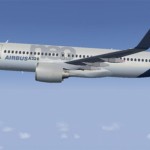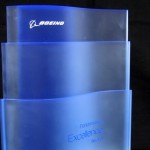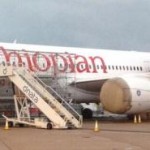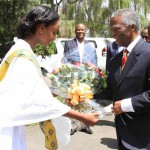 Six major aircraft manufacturers are bidding to supply narrow body passenger aircraft to the Ethiopian Airlines, it was learnt.
Six major aircraft manufacturers are bidding to supply narrow body passenger aircraft to the Ethiopian Airlines, it was learnt.
Mitsubishi of Japan, Ilyshin of Russia, Embraer of Brazil, Bomardier of Canada, the European consortium Airbus and the US airframer, Boeing, are the six companies bidding to supply aircraft to Ethiopian. The companies are proposing regional jets with 80-120 seats. Ethiopian could buy 10-20 narrow body aircraft that it will deploy on its regional routes.
The management of Ethiopian Airlines recently issued request for proposal inviting companies to present their proposals for the supply of narrow body aircraft. The CEO of Ethiopian Airlines, Tewolde Gebremariam, told The Reporter that the companies have submitted their proposals to the airline. Tewolde said the proposals are being evaluated by the technical committee of the airline. According to the CEO, the evaluation process will be finalized and the results will be announced after three months.
Mitsubushi has presented its MRJ jets. Ilyshin Finance CO. proposed the Sukhoi 100 aircraft. The Brazilian manufacturer presented the E-Jets. Bombardier came up with the C-series aircraft. Boeing proposed its new B737 MAX aircraft while its European arch rival Airbus demonstrated the much fanfared A320NEO aircraft.
Ethiopian fleet is dominated by Boeing. Currently, the airline operates B737, B757, B767, B777 B787 and two MD 11 freighter aircraft. On the domestic routes the airline operates Bombardier Q400 aircraft. Ethiopian has the youngest fleet of aircraft in Africa. In line with Ethiopian 15 year development roadmap, Vision 2025, the carrier plans to double its fleet to 112 planes and carry 18 million passengers over 92 routes by 2025.
At the Travel Agents Awarding ceremony held last Saturday at the Addis Ababa Golf Club, Tewolde assured the travel agents that the airline will replace all the aging aircraft. The CEO said that the airline has continued to renew its fleet adding that that the airline will phase out the B767 and B757 aircraft the airline used for 14-16 years.
According to Tewolde, this year the airline will take delivery if 14 new aircraft out of which five are Boeing 787-8 Dreamliner aircraft. Out of the 14 aircraft eight are wide body. The airline wanted to phase out the aging B767 and B757 aircraft earlier but was unable to do so due to the delay in the delivery of the Dreamliner aircraft. Ethiopian now is operating five Dreamliners and five more will be delivered to it between March and July this year.
The airline honored 31 travel agents who registered remarkable performance in ticket sales. Twenty eight of them were honored for the high sales volume they registered while three of them were honored for dramatic increase in sales volume.
Abba, Dawe and Ethio Gulf raked one to three. Sheba, Star and Gateway received their prizes for their dramatic increase in sales volume. Tewolde awarded certificates and monetary awards.
In his key note address Tewolde said that the travel agents favor Ethiopian Airlines not only because of its service but also out of national feeling. However, he said, the work cannot be done based on patriotism alone. “We should excel by providing premier quality service. We are not perfect. There are some deficiencies and we have to rectify those and improve the quality of service we render to customers both on the ground and in the air,” Tewolde said.
“The airline is a national airline and it belongs to all Ethiopians. I and my colleagues are only managing it for some time. So thank you for favoring your national flag carrier Ethiopian.”
Sales director for Addis Ababa area, Seblewongel Degafe, said that her department planned to sell tickets worth five billion birr in the 2012-2013 fiscal year and achieved only seven percent less of the target. Seblewongel said in the current fiscal year the department planned to sell seven billion birr. “With the strong support of the travel agents we will attain our target.”
Thirteen international airlines fly to Addis Ababa. Ethiopian has a lion share of 70 percent on the Addis Ababa market. Ethiopian sells 65-70 percent of its ticket through travel while five percent is sold online.




























Join Conversations